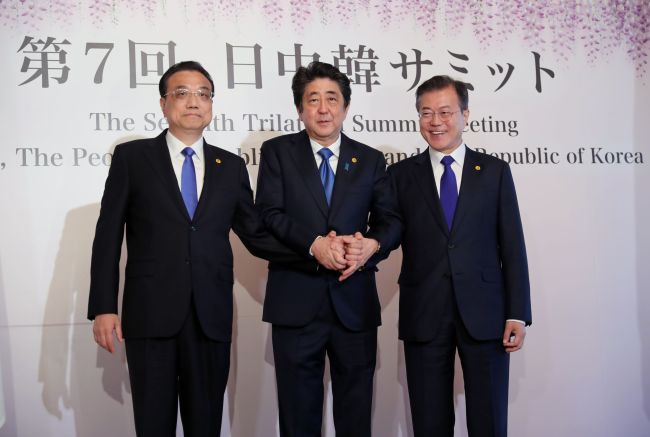South Korea, China and Japan on Wednesday issued a joint statement supporting the Panmunjeom Declaration, at their first trilateral summit held in more than two years.
At the summit, held in Tokyo, the three countries also called for cooperation in the denuclearization of the Korean Peninsula, closer ties and resumption of regular trilateral meetings.
“We share the view that complete denuclearization and establishment of lasting peace on the Korean Peninsula is very important to peace and prosperity of not only the Korean Peninsula but Northeast Asia,” President Moon Jae-in said, thanking Japanese Prime Minister Shinzo Abe and Chinese Premier Li Keqiang for the special declaration.
 |
| South Korea`s President Moon Jae-in (R), China`s Premier Li Keqiang (L) and Japan`s Prime Minister Shinzo Abe (C) join hands as they pose for photos prior to the start of their trilateral summit in Tokyo on May 9, 2018.(AFP-Yonhap) |
In the statement, the three countries welcomed the Panmunjeom Declaration and its stipulation of complete denuclearization, and promised to cooperate for peace and stability of the region.
“I hope, and promise, that close communication and cooperation among the three countries are maintained through the process of establishing lasting peace,” said Moon.
Saying that “the goal of cooperation is to enable the people to feel and enjoy the results,” Moon went on to say that the three countries will work together in resolving environmental issues, and to develop new joint projects in the fields of energy and information and communication technologies.
According to Cheong Wa Dae, Moon briefed Abe and Li on the Panmunjeom Declaration adopted at the April 27 inter-Korean summit, and said that Seoul will maintain “strategic communication and cooperation” with Tokyo and Beijing on related matters.
Moon also reiterated that Pyongyang appears to be sincere in promising denuclearization.
“Through frank conversation (with North Korean leader Kim Jong-un), I was able to reaffirm Kim’s will to denuclearize,” Moon was quoted as saying by his chief press secretary Yoon Young-chan.
“In particular, the North’s decision to transparently reveal the closure of the Punggye-ri nuclear test site to the international community clearly demonstrates (Kim’s) determination for the success of the North Korea-US summit.”
As for Abe, the Japanese leader called for closer economic cooperation, and once again stressed the need for concrete actions from North Korea.
Saying that Tokyo shares the position that UN Security Council resolutions should be fully implemented with Seoul and Beijing, Abe said that the three countries will work closely together to push Pyongyang to take the desirable path.
“Abduction, nuclear (weapons), missiles, if North Korean continues on the right path on such matters, (Japan) will move towards normalization of relations,” Abe said, speaking to the press after the morning meeting.
The Chinese premier largely echoed Moon and Abe, and stressed China’s role in resolving Korean Peninsula issues. Although Beijing-Pyongyang relations had been strained for some years, Kim’s recent meetings with Chinese President Xi Jinping have hinted at a shift in dynamics.
“China hopes that this opportunity will be used to resume dialogue, and for the Korean Peninsula issues to be resolved politically,” Li said.
“(China) expects the process to lead to denuclearization and lasting peace. China will continuously play a constructive role.”
He went on to say that the trilateral summit should be held once a year, and that China hopes to play “many roles” as the host of the next trilateral summit. He also called on the countries to collaborate on forming a trilateral free trade agreement.
By Choi He-suk (cheesuk@heraldcorp.com)

